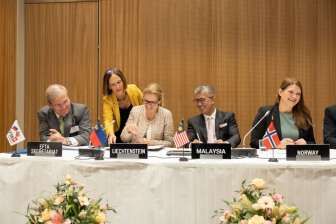Free trade agreement signed with Malaysia

This year's EFTA Ministerial Meeting took place in Tromsø on Monday, June 23, 2025, under the chairmanship of Norwegian Trade Minister Cecilie Myrseth. Deputy Prime Minister Sabine Monauni attended on behalf of Liechtenstein. In light of the current tensions in global trade relations, the ministers reaffirmed the value of EFTA's extensive free trade network and agreed to examine ways to develop it further. They also used the occasion to sign a free trade agreement with Malaysia.
The ministers welcomed the developments in EFTA's trade relations since their last meeting in June 2024, in particular the signing of new agreements with Thailand and Kosovo and the modernized agreement with Ukraine. They also took stock of the ongoing negotiations with MERCOSUR (Argentina, Brazil, Paraguay, Uruguay) and Vietnam and agreed to take these negotiations forward. The ministers also exchanged views on the ongoing negotiations with Singapore on an agreement on the digital economy and called on the negotiators to strive for an early conclusion.
With regard to the Trade and Economic Partnership Agreement with India (TEPA), the ministers welcomed the progress made towards the entry into force of the agreement, which is expected to take place in the second half of 2025. In anticipation of this, EFTA continues to prepare for the implementation of investment promotion and cooperation commitments under the TEPA. Ministers also highlighted Canada, Mexico and the Republic of Korea as potential partners for the modernization of existing agreements and discussed the importance of EFTA activities with potential new partners, particularly in Africa.
Close relations between the EFTA states and the EU
Close cooperation with the EU based on shared values in the current geopolitical environment was another topic of the high-level talks. The ministers of the EEA/EFTA states emphasized the importance of coordination between them and the EU on urgent issues, including the implementation of sanctions against Russia and Belarus, and the importance of a homogeneous economic area. With regard to the further development of the EEA Agreement, they welcomed the progress made in 2024 with regard to the implementation of legal acts. For his part, Swiss Federal Councillor Guy Parmelin provided information on the package of agreements between the EU and Switzerland, which is currently undergoing the respective approval procedures of the parties.
Free trade agreement signed with Malaysia
On the sidelines of the meeting, the ministers of the EFTA states and Malaysia signed an Economic Partnership Agreement. This is a broad-based agreement covering trade in goods, services and investment. It also includes areas such as economic cooperation, trade and sustainable development, intellectual property rights, rules of origin, competition, trade facilitation, government procurement, sanitary and phytosanitary measures and technical barriers to trade. The parties also signed a Memorandum of Understanding on Cooperation and Capacity Building and a Joint Declaration on Sustainable Palm Oil.
Trade between the EFTA states and Malaysia has increased steadily in recent years, reaching a volume of EUR 2.14 billion in 2024, with imports from Malaysia valued at EUR 1.09 billion and exports from the EFTA states to Malaysia at EUR 1.05 billion. The EFTA states' most important exports in 2024 included machinery and mechanical appliances, pharmaceuticals, electrical machinery, precision instruments and watches, while imports from Malaysia were dominated by electrical machinery, machinery and mechanical appliances, precision instruments, rubber and aluminum.
Deputy Prime Minister Sabine Monauni welcomed the signing of the agreement with Malaysia: "The comprehensive Economic Partnership Agreement between the EFTA States and Malaysia offers many advantages. I am particularly pleased that it also contains several provisions to facilitate the participation of SMEs in our bilateral trade relations."
Exchange with parliamentarians and business representatives
The ministers also met with EFTA's advisory bodies, the Consultative Committee and the Parliamentary Committee, for a dialog on EFTA's activities. The members of parliament and representatives of trade unions and employers' organizations from the four EFTA states discussed EFTA's trade policy, including the status of current processes and possible future directions. They also discussed the modernized EFTA-Ukraine Free Trade Agreement and its importance for the reconstruction of Ukraine in general. From Liechtenstein, the two members of parliament Sebastian Gassner and Roger Schädler took part in the Parliamentary Committee, as well as the Managing Director of the Liechtenstein Chamber of Commerce and Industry, Maximilian Rüdisser, and Sigi Langenbahn from the Liechtenstein Employees' Association in the Consultative Committee.